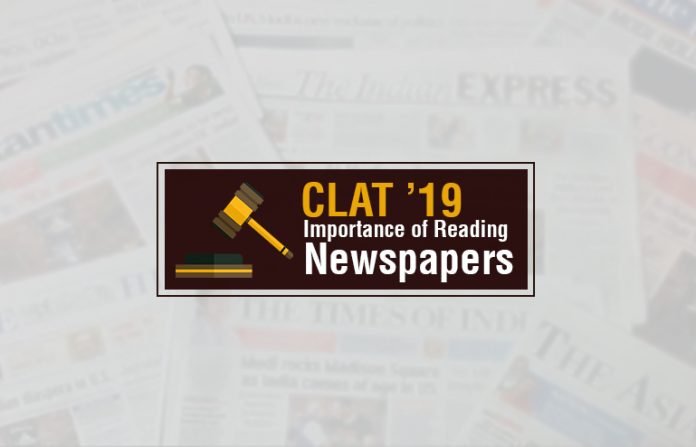The Common Law Admission Test (CLAT) is a test of one’s reasoning and aptitude. At the same time, CLAT and other law entrances are designed to gauge your abilities to reason, and your speed of reading and comprehension. Usually, these entrance exams have five sections: General English/Verbal Ability, Elementary Mathematics, Logical Reasoning, General Awareness, and Legal Aptitude. Except for Mathematics, all the other sections require you to read and comprehend quickly; and find the appropriate solution in the shortest possible time.
While reading newspapers has a lot of benefits in the context of any competitive exam, for CLAT especially, it’s nothing short of a boon. Despite the ubiquity of electronic and digital media, newspapers continue to remain an invaluable source of information, especially in areas where high speed internet is still a dream. Newspapers not only boost your knowledge of current affairs, they are also an important tool for the other sections of law entrance exams.
English/Verbal Ability:
Reading newspapers regularly benefits those who struggle with the language. It helps improve your vocabulary and speed of reading, which, in turn, enables you to read and comprehend the RC passages within a short span of time. To start with, highlight any new word you encounter; and look up its meaning in the dictionary. As your knowledge slowly improves, you will find yourself becoming more confident about the section. At the same time, newspaper articles provide you with a general idea about sentence formation, which comes of use in questions based on sentence correction; and even those on logical and legal reasoning by helping you understand the context the questions are referring to.
Logical Reasoning:
While the most common measure of the benefit of reading newspapers is in the context of English and General Awareness, its importance in improving your reasoning abilities remains underrated. Reading newspapers daily sharpens your mind; and hence, hones your logical abilities. A good number of questions in law entrances like CLAT and AILET are asked from this area. So, start reading newspapers today.
General Awareness:
No one can doubt the importance of newspapers for doing well in this section. The primary—but not sole—objective of reading newspapers is to acquaint yourself with current affairs, which, in recent times, has been the predominant part of the General Knowledge section in law entrances, especially CLAT. Newspapers often provide information you might not find from news on other media. Moreover, by covering historical aspects of events covered, they help you in static GK too.
Despite the obvious benefits, many of us are averse to reading newspapers, not because they get the same information from other media, but mainly due to the inconvenience and difficulty of sifting news from pages that are littered with advertisements.
Tips to reading newspapers for CLAT:
Given the fact that reading newspapers is a time-consuming affair, you should opt for selective reading. This will automatically develop your ability to filter the important areas to read, while developing your knowledge on how to ignore the non-relevant parts.
Editorial:
No doubt, one of the important aspects of a newspaper is its editorial page. Generally, related to current issues, these are mostly written by eminent and qualified personalities in their respective fields, who present their views and thoughts on various matters. Reading editorials helps you look at issues from different angles/perspectives, thus developing your evaluation ability. Moreover, because of the various tones used by the authors, reading editorials will also prove helpful in cracking questions related to passages, which are tone-specific.
Important Events:
The most important events generally feature of the front page of a newspaper. While other important news is covered selectively, on pages dedicated to domestic and international affairs. Thus, one must develop the ability to figure out news which talks about the following: important appointments, political events, sports events, economic events, scientific events, and important judicial events. You can ignore news, which are specific to a single state; and has less significance to the overall society.
Vocabulary:
One cannot ace CLAT without working on one’s vocabulary. Not only does the English section carry 40-50% vocab-based questions, but also a good vocabulary ensures you understand sentences correctly. Mark, and highlight, new words you come across every day. Even 20 words a day for six months would mean you would have learnt more than 3500 new words! That will surely take care of the vocab-based questions.
To sum up, the importance and benefits of reading newspapers daily in the context of CLAT are: 20 Vocab-based questions, 50 questions on General Awareness, 15 on Logical reasoning, and 35 Legal Reasoning questions, which is 60% of the CLAT paper!
Moreover, you will be, slowly but surely perfecting your ability to decipher important news from redundant ones.
CLAT 2019 is likely to be held on May 13, 2019. Stay tuned to LST for updates on exams.
Happy reading!






















































Sir aap konsa newspaper recommend karte hai clat ke liye